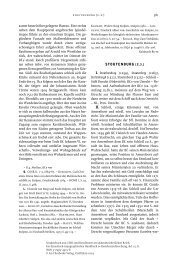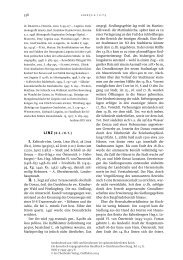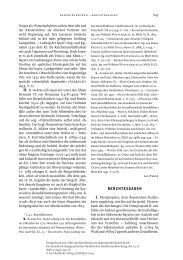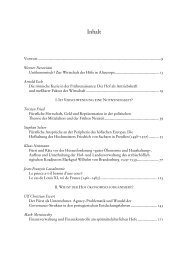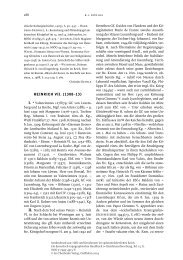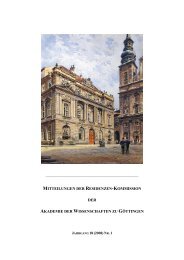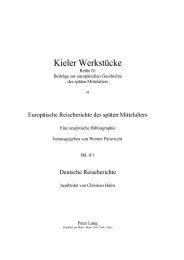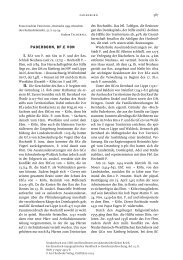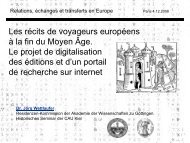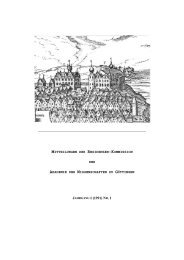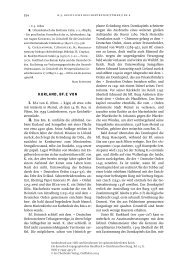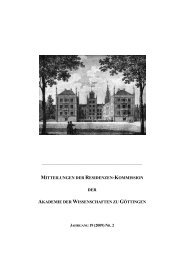MITTEILUNGEN DER RESIDENZEN-KOMMISSION DER ...
MITTEILUNGEN DER RESIDENZEN-KOMMISSION DER ...
MITTEILUNGEN DER RESIDENZEN-KOMMISSION DER ...
Erfolgreiche ePaper selbst erstellen
Machen Sie aus Ihren PDF Publikationen ein blätterbares Flipbook mit unserer einzigartigen Google optimierten e-Paper Software.
that a luxurious lifestyle, enormous material expenditure, and the performance of complicated<br />
ceremonial were the only things furthering civilization. He put up for discussion the idea that<br />
a lack of luxury might sometimes have produced integrative incentives. At the smaller and<br />
middling courts a shortage of resources and the associated pressures to be thrifty could reduce<br />
the social barriers between the court in the narrow sense – those who had free access to the<br />
ruler – and the court in the wider sense. Scholars so far, he suggested, have not taken enough<br />
account of improvisation at court which encouraged communication, or of co-operation between<br />
the residence, town, and country which conserved resources.<br />
Forms of payment used within and between courts were the subject of the second session:<br />
‚Between Dotation, Salary, Symbolic and Real Capital.‘ The virtue of generosity (largesse)<br />
was the thematic core of Frédérique Lachau’s (Paris) paper on ‚The Gift in the Culture of the<br />
Court, with Special Reference to England and France, Twelfth to Thirteenth Centuries‘.<br />
Chronicles and courtly romances, but also the files produced by the English royal court administration<br />
provide insights into how this specifically courtly behavioural norm was translated<br />
into practice. Lachaud discussed the leitmotivs in the contemporary normative discourse<br />
about gift-giving as social practice, demonstrated that they derived from the philosophical<br />
literature of Antiquity and the religious-didactic literature of the High Middle Ages, and<br />
emphasized, in conclusion, that courtly-secular writers and clerical authors held strongly<br />
contrasting views of the essence and the limits of largesse. In their paper entitled ‚A Waste of<br />
Money? On the Social Function of Luxury Consumption‘, Ulf-Christian Ewert (Chemnitz)<br />
and Jan Hirschbiegel (Kiel) showed that the production of luxury, ostentatious consumption,<br />
and gift-giving at the late medieval court should be considered as profitable investments<br />
which allowed princes to establish and maintain a balanced social system of personal relationships<br />
enabling them to exert power. Furthermore, they argued that although efficient in<br />
maintaining the social order at court, luxury consumption was, in a sense, a rational but presumably<br />
non-efficient strategy with respect to competition for status and prestige. In her<br />
paper on ‚„Weder Fisch noch Fleisch“ – wenn alle Gaben zwischen symbolischem und realem<br />
Kapital schwanken‘, Beatrix Bastl (Vienna) looked at the qualities of the specifically<br />
aristocratic belief system, and at the associated accumulation of symbolic and real capital.<br />
Attempts were made in the early modern period to create a balance between the economic<br />
power of the various aristocratic families through marriage contracts and wills in particular.<br />
Exclusively aesthetic or craft-based criteria alone cannot do justice to the state-sponsored art<br />
of the modern and Baroque periods, as Hans Ottomeyer (Berlin) pointed out in his paper,<br />
‚Bernstein und Politik – Staatsgeschenke des preußischen Hofes bis 1713‘. In it he looked at<br />
the use of objects of art as diplomatic gifts in Prussia’s contacts with Russia, Austria, Denmark,<br />
and France in the sixteenth and seventeenth centuries. Amber was the most suitable<br />
material for a state gift intended to signal legitimate territorial claims. Only the Prussian<br />
monarch could own amber, and in legal terms it was directly linked with his sovereignty.<br />
Anyone who wanted to achieve anything within the court system and initiated material<br />
transactions for this purpose had to find a balance between what was necessary and what was<br />
possible. One extreme consisted of all the normative expectations of the ‚public‘, in particular,<br />
the ‚selective, qualified public consisting of the men of power, without whom no prince<br />
could achieve anything‘ (Werner Paravicini). The other extreme consisted of the available<br />
material and cultural resources. In the third session, ‚Expenditure: Between Economics and<br />
Honour‘, luxury and its intended effect were examined from the point of view of practical<br />
good sense. Traditionally, there has been more interest in the income of English kings of the<br />
twelfth and early thirteenth centuries than in their expenditure. In ‚The Kings of England and<br />
their Neighbours in the Twelfth and Early Thirteenth Centuries‘, John Gillingham (Brighton)<br />
looked at the Crown’s expenditure between the Norman Conquest and the early 1220s, with<br />
33




